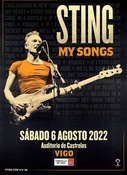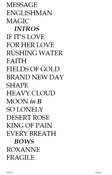
Vigo deserves Sting...
The British musician performed in Castrelos at a vibrant concert that will go down in history.
The third time was the charm, and Vigo was finally able to enjoy a concert that was supposed to take place in 2020 and was postponed twice due to the pandemic. The wait was worth it, because Sting's performance will be remembered forever in Vigo, just like Dire Straits' 30 years ago, Leonard Cohen's in 2009, or the Rolling Stones' in 1998. Sting's debt to Vigo (or rather, the other way around) wasn't just due to COVID; it went back much further. It was completely anomalous that the British musician had never performed in Galicia's largest city. A shortcoming that was remedied on Saturday.
Last night's performance was also a multigenerational phenomenon like few others can remember. In the front rows—where this columnist watched the concert after queuing religiously—were crowded with teenagers, boomers, and even a septuagenarian. "How old is Sting?" asked two twenty-somethings from Ribeira. "Seventy," the journalist replied, to his disbelief. It's true that the Brit shies away from some high notes—it was noticeable in "If I Ever Lose My Faith in You"—but his vocal and body composition are enviable. And to rule out any hint of ageism, two fathers, Sting and his right-hand man Dominic Miller, and their two respective sons, Joe Sumner—who served as a more than worthy opening act—and Rufus Miller, the second guitarist, were on stage. The rest of the band featured more young blood, especially the almost beardless drummer Zach Jones, who delivered despite not having the track record and exuberant virtuosity of his illustrious predecessors in the role, Josh Freese, Vinnie Colaiuta and Stewart Copeland.
The recital began with an unbeatable trio: "Message in a Bottle" (1979), "Englishman in New York" (1987), and "Every Little Thing She Does Is Magic" (1981), that is, Sting's greatest solo hit sandwiched between two Police anthems. After this unbeatable start, it was time for the introductions, during which Sting emphasized that it was his first time playing in Vigo.
Sting prides himself on wanting his musicians to shine, and on this "My Songs" tour, he lets his backing vocalist Gene Noble shine in "Shape of My Heart" (1993), the ballad from the film "The Professional (León)," an action movie starring Jean Reno—a French actor who recently filmed in Vigo—and Natalie Portman. The same goes for Melissa Musique, whose impressive voice dazzled in "Heavy Cloud, No Rain" (1993). “A song about climate change, it’s not funny,” Sting remarked, as a gentle drizzle fell, belying the song’s title.
Before the start of “Brand New Day” (1999), Sting joked that harmonica player Shane Sager might not be able to match Stevie Wonder’s mastery of the song’s original version. “How old are you?” “Almost 17.” In reality, Sager is nearly 30, and in any case, he perfectly replicated the Michigan genius’s harmonica playing.
Before these songs, Sting performed three songs from his fifteenth and most recent album, “The Bridge” (2021), specifically the optimistic “If It's Love” (with a whistled melody); the Spanish version of “For Her Love”—which he had only previously sung in Chiclana, Cádiz—and “Rushing Water.” This was followed by “If I Ever Lose My Faith in You” (1993), a paean to skepticism about anything other than love: “I lost my faith in our politicians; they all seemed like game show hosts to me,” the lyrics say. The band beautifully linked the end of this song with another from the same album (“Ten Summoner’s Tales”), “Fields of Gold,” in which, in the absence of the bagpipes from the original—one had fantasized about Carlos Núñez jumping on stage to play them—Shane Sager’s harmonica and Rufus Miller’s baritone guitar took center stage. The song "Campos de oro" was, as a snob would say, one of the "highlights" of the concert, and "lights" couldn't be more appropriate, because the flashlights on mobile phones (like the lighters of old) formed a constellation of lights in the stalls and the stands, which were packed to the brim.
The more swaying and bluesy Sting of "Heavy Cloud No Rain" gave way to another of The Police's vintage hits, "Walking on the Moon" (1979). By now, it was already clear that the sound was one of the cleanest ever heard at a crowded concert in Vigo, on par with Dire Straits in 1992. In the final stretch, "So Lonely" (1978), in which Sting introduced a part of Bob Marley's "No Woman No Cry"; "Desert Rose" (1999), a song influenced by Algerian raï; and "King of Pain" (1983), a Police smash hit in which the amiable Joe Sumner returned to the stage. At 45, Sting's muscular eldest son—the fruit of his first marriage, to actress Frances Tomelty—resembles a cross between his father and his friend Bruce Springsteen. And, finally, of course, "Every Breath You Take" (1983), Sting's song with a capital "A," featuring those unmistakable arpeggiated ninth chords that also characterize "Message in a Bottle" and "De do do do, de da da da," something unusual in rock guitar (where fourths, fifths, and sevenths dominate) and which gives these songs a surprising yet pleasing tonal sophistication. We must thank Dominic Miller for largely respecting the guitar style coined by the great Andy Summers in The Police's songs, without abandoning his signature sound.
The encore featured "Roxanne" (1978), The Police's first big hit, featuring Kevon Webster's reggae keyboards and an insert of a Duke Ellington classic, "It Don't Mean a Thing (If It Ain't Got That Swing)" (1931). A nod to Sting's jazz roots and two of his influences, the aforementioned Duke of Jazz and singer Ella Fitzgerald.
Sting has been closing his concerts with “Fragile” (1987) for decades, and Vigo was no exception. The musician from Wallsend—the English city where Hadrian's Wall ended, hence its name—put down his old 1957 Fender Precision bass and picked up a nylon-string guitar to perform this song, which at the time had a version with Spanish lyrics and which, live, also contains a tribute to Spanish music that goes unnoticed by almost everyone: towards the end of “Fragile,” Sting sketches out the arpeggio that begins “Asturias (Leyenda)” (1890), by the Girona composer Isaac Albéniz. It's likely that when he plays it this Monday in Girona, almost no one will notice this detail.
It mattered little that, except for the three songs from 2021, all the others were, literally, from the last century. The audience left Castrelos as if walking on the moon, almost weightless, after an hour and a half of musical ecstasy. As our colleague Alberto Leyenda said, someone should tell us if a better musician than Sting plays in Castrelos in the next twenty years.
(c) Faro de Vigo by Rafa López



